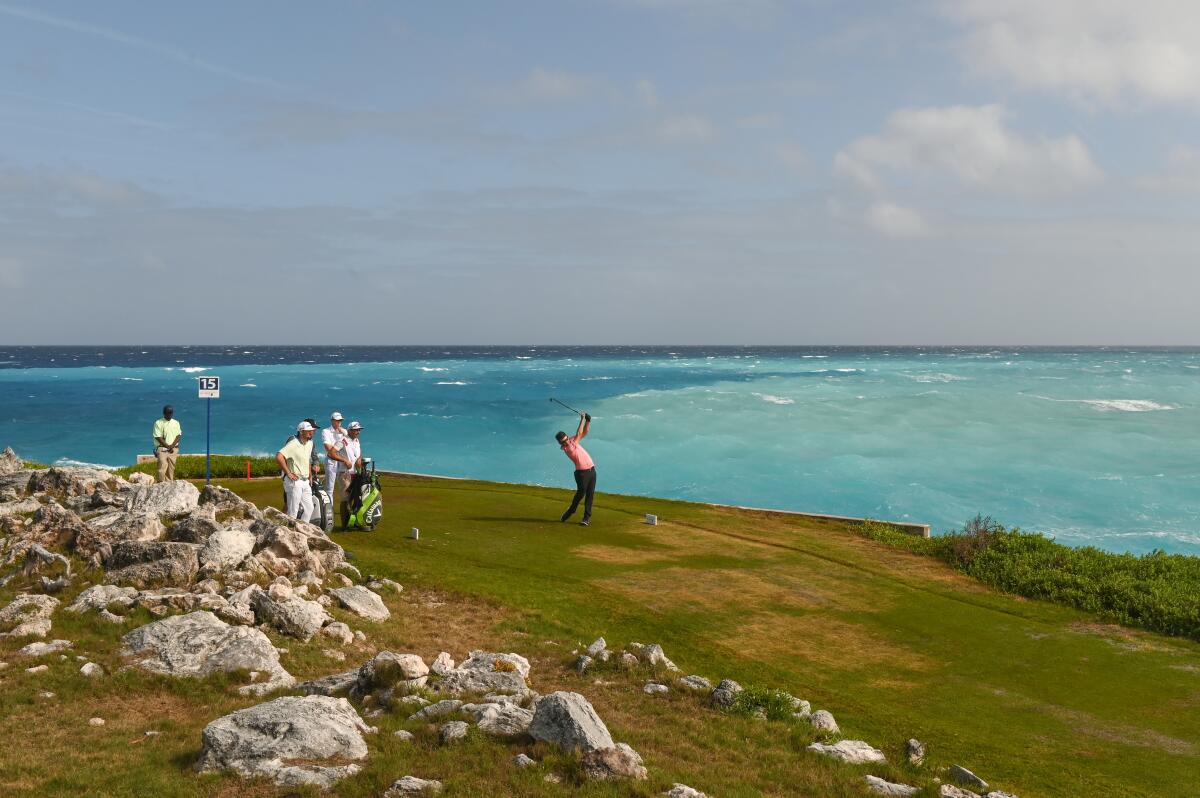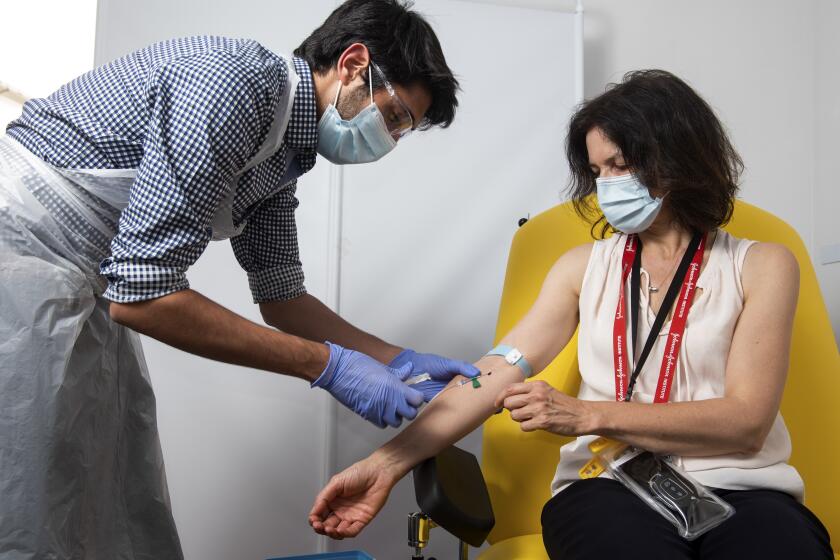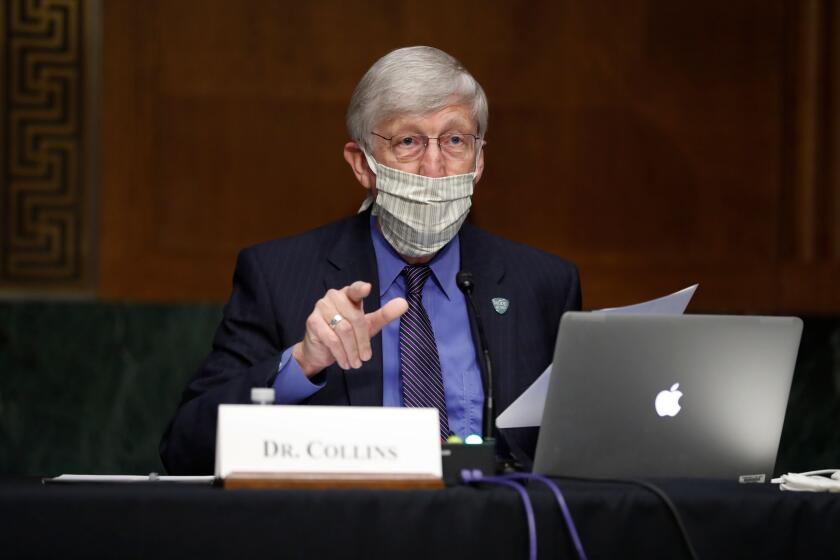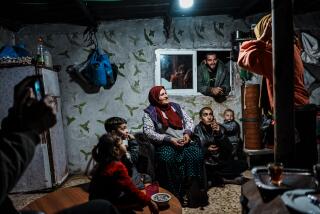Bahamas closes borders to U.S. tourists after coronavirus cases spike; others welcome

Less than three weeks after reopening its borders to international visitors, the Bahamas on Sunday announced that it is closing all of its airports and seaports to tourists from the United States, effective Wednesday.
Bahamasair, the country’s national carrier, will cease all outgoing flights to the United States immediately, Prime Minister Hubert Minnis said in a national address Sunday.
Outgoing commercial flights will still be permitted to accommodate visitors scheduled to leave the Bahamas after Wednesday, he said. Visitors from Canada, the United Kingdom and the European Union will still be permitted to visit as long as they can show proof of a negative RT PCR test for coronavirus infection from an accredited laboratory taken within 10 days of their arrival. Also allowed under the new order: private international flights and charters and pleasure crafts.
“Regrettably, the situation here at home has already deteriorated since we began the reopening of our domestic economy,” said Minnis, who has been serving as the island nation’s acting health minister since May. “It has deteriorated at an exponential rate since we reopened our international borders.”
On Sunday, the Bahamas Ministry of Health registered 15 new cases of COVID-19, the respiratory disease caused by the coronavirus, for a total tally of 153 cases, Minnis said. Of the total, 49 new infections have been recorded since the country’s borders fully reopened July 1. And of that number, 31 have been registered on the island of Grand Bahama, which had been COVID-19 free for a little over two months and is still recovering from last year’s devastating hurricane.
“Our current situation demands decisive action, if we are to avoid being overrun and defeated by this virus,” Minnis said. “We cannot allow our hospitals to be overrun. Many priorities must be balanced, be they health, social and economic.”
Scientists say their experimental coronavirus vaccine has been shown in an early trial to prompt an immune response in hundreds of people.
The U.S., and Florida in particular, represents the largest tourism market for the Bahamas, which has been keeping a close eye on Florida’s high case count and death toll. On Sunday, Florida’s state dashboard reported 12,478 new cases, the second-highest total for a Sunday but far below last week’s 15,300.
Faced with such stark numbers and the increased movement of Bahamians since the country reopened, Minnis also announced new restrictive measures, and warned that more could come if the Bahamas doesn’t see a change in its own spiking infections. As of Monday, all public and private beaches on the island of New Providence, where the capital of Nassau is; Paradise Island; Rose Island; Athol Island; and surrounding cays will be closed as of 5 a.m., he said.
Also because of the confirmed COVID-19 infections in Grand Bahama, Minnis said, a new islandwide curfew from 7 p.m. to 5 a.m. will go into effect beginning Monday. All indoor dining, public and private beaches and parks also will be closed until further notice.
“All congregant activities and gatherings, inclusive of religious services, weddings and funerals and sporting activities will not be allowed, effective Monday,” Minnis said. And beginning Wednesday, Grand Bahama’s international and domestic borders will be closed to all incoming and outgoing flights and sea vessels.
“If efforts to decrease the number of cases are unsuccessful, other restrictive measures may be recommended, including a lockdown beginning Friday the 24th of July,” Minnis said.
The Bahamas’ tighter restrictions come just days before the nearby Turks and Caicos Islands, which reported a 41.4% increase in new cases last week, is scheduled to reopen its borders to international tourists Wednesday.
It’s “bizarre” that mask-wearing in the U.S. has become so partisan and the “divide between different political perspectives” is making it harder to curb the coronavirus, the director of the National Institutes of Health said.
The Pan American Health Organization has warned that the reopening of borders comes with risks and countries must not only be equipped to trace and isolate new infections but shut down their borders if need be.
“If we address the current increase in confirmed cases as quickly as possible, Grand Bahama can return to a greater sense of normalcy as soon as possible,” Minnis said.
Like other Caribbean nations, the Bahamas has faced a dilemma with the spiking cases in the U.S. For example, after initially saying that no test would be required for tourists, it soon changed the requirement after cases in Florida, Texas, Arizona and other states began to flare up in late June.
Other islands have delayed their reopening dates, tightened testing protocols or announced bans on U.S. visitors for the time being.
On Sunday, Minnis also reminded Bahamians that it was a criminal offense for them to forge test results, after officials reported receiving falsified tests. Anyone who presents a falsified test will be subject to a $2,000 fine, two years imprisonment or both. Also, anyone who knowingly exposes or infects someone when they believe they are positive faces a $1,000 fine for every person who has been exposed or infected.
“We do not know the long-term effects of this virus. Do not listen to people who tell you it is like a mild flu and that you will be fine,” Minnis said, speaking to the country’s 385,600 inhabitants. “There may be serious long-term effects to people of all ages, effects that diminish quality of life, and possibly shorten life.”
Pro sports leagues are jumping the line to get COVID-19 tests back within hours.
National solidarity, he said, was critical in this crisis.
“This crisis is testing nations. It is testing our people. It is testing our resilience, it is testing our faith,” Minnis said. “There’s one common enemy today; that enemy is the COVID-virus ... .The countries that come out of this better will be the disciplined countries.
“Countries and people who do not follow sensible public health advice and policies will have more deaths, sickness and chaos.”
More to Read
Sign up for Essential California
The most important California stories and recommendations in your inbox every morning.
You may occasionally receive promotional content from the Los Angeles Times.













